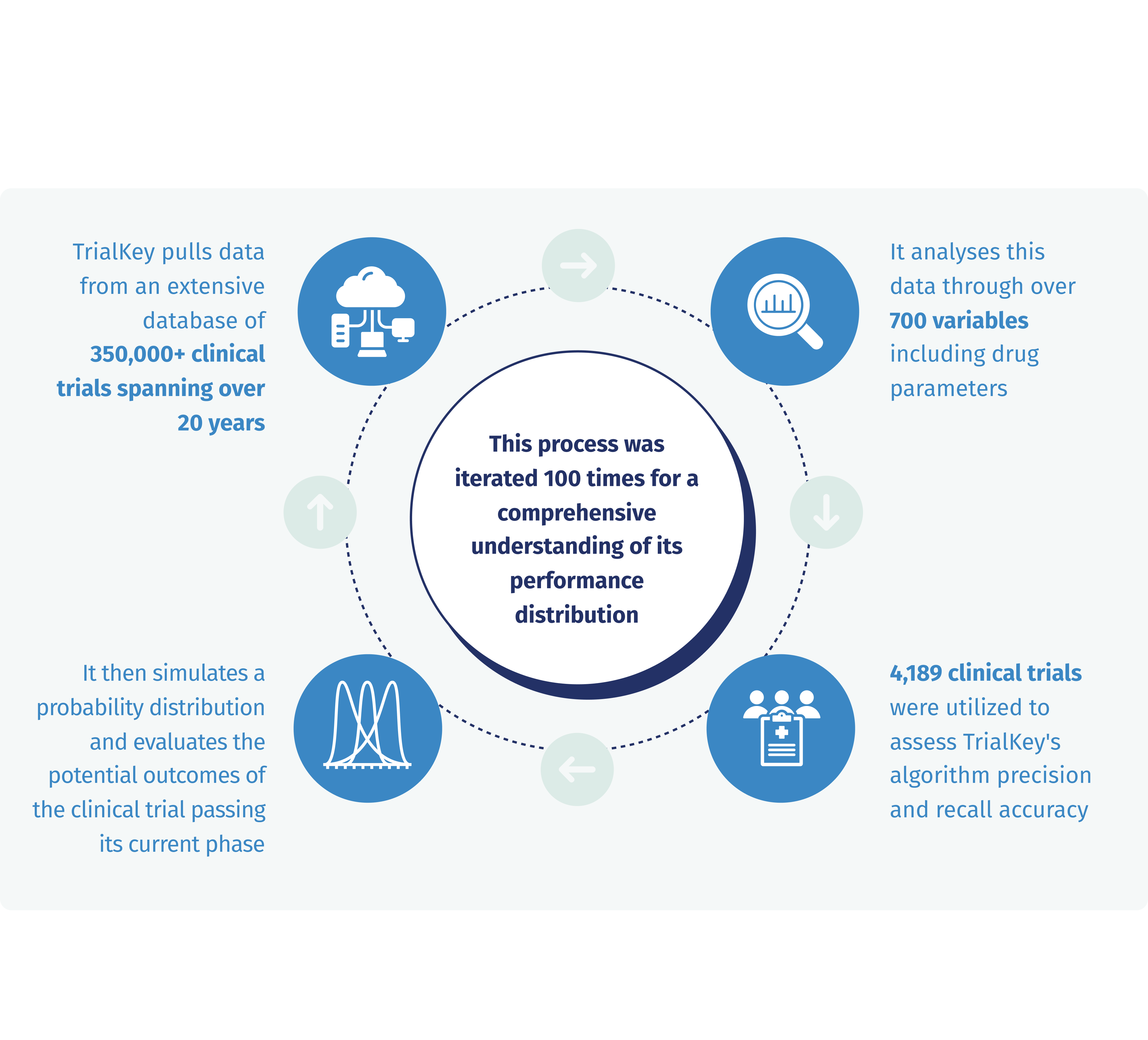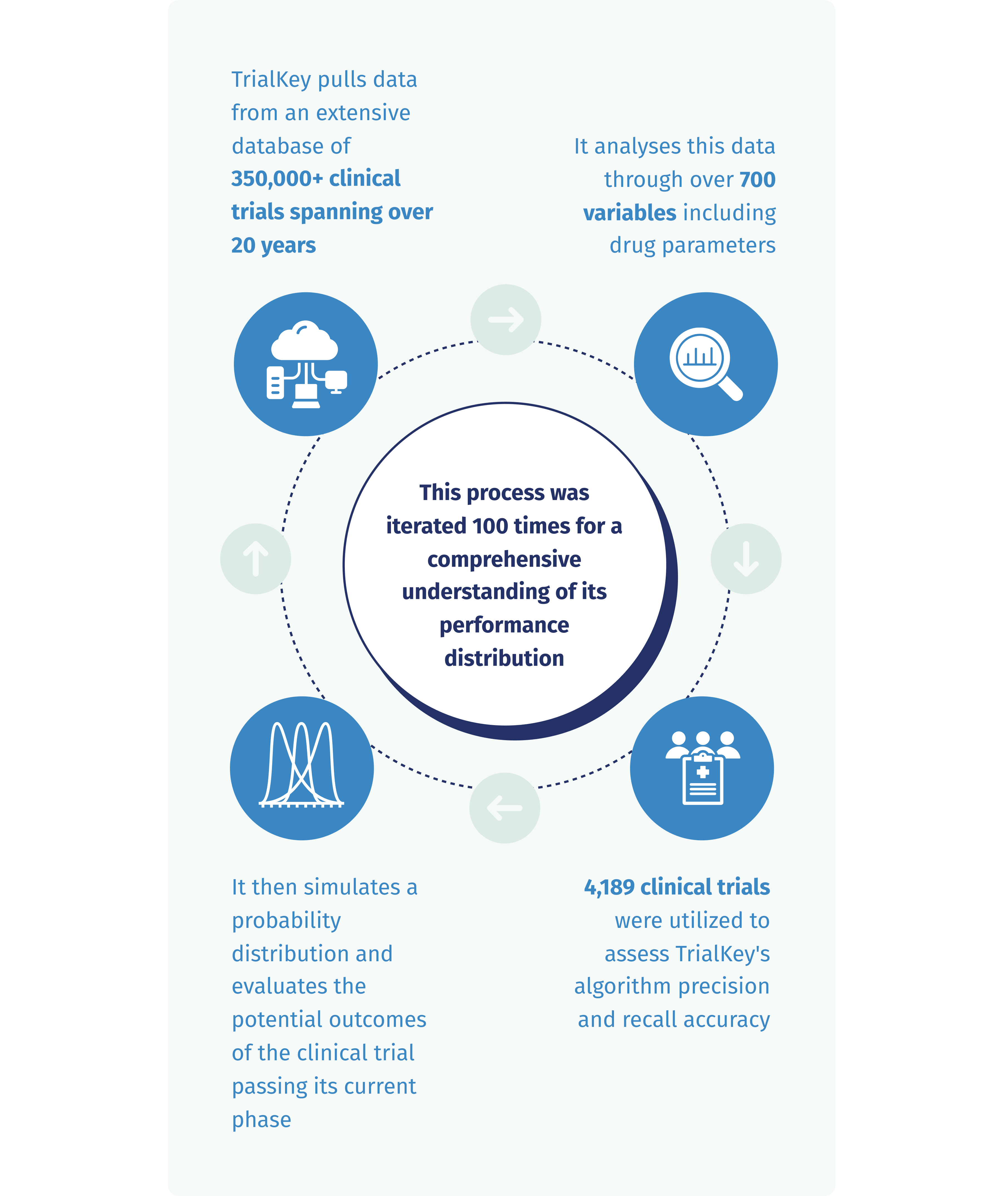Pivotal clinical trials cost $48 million on average and unfortunately, only 10% succeed.
Clinical trials are the foundation of medical progress. Every new drug or medical device needs to qualify through a clinical trial before market launch. The methods used to design clinical trials have not changed for over 30 years. They are slow-moving, expensive, and lack transparency.
In the relentless battle against time and resource constraints, biopharma companies face the harsh reality that diseases often spread faster than the time it takes to find a cure.
Recognizing the urgent need for technological solutions, TrialKey addresses this challenge by harnessing predictive analytics capabilities and machine learning to enhance efficiency and reduce the time and cost associated with clinical trials.
In employing AI and GPT-4 to analyze real-world trial data, we are able to provide users with:
- Access to a broad spectrum of 350,000+ clinical trials, inclusive of medical devices, alternative therapies, and non-randomized drug control trials.
- Precise estimates of a clinical trial's probability of success in its current trial phase
- A clinical trial simulator that provides a close-to-actual preview of how a trial will perform based on its design.
- Competitor view showing important information and statistics among closest competitors for effective analysis and benchmarking.
- Crucial details from free-text entries in clinical trials extracted through Natural Language Processing (NLP) techniques facilitating insightful analysis.
- Custom reports providing in-depth analysis of therapeutic areas or treatments pertinent to users' research interests.
- Actionable insights tailored to enhance every aspect of trial design.
- Advanced search, sorting, and filtering functions facilitating rapid identification of relevant trials and their closest competitors.
- Comprehensive overviews of promising research areas and detailed timelines for ongoing trials within specific fields.
How does TrialKey work?


Methodology
TrialKey’s datasets undergo a rigorous curation and categorization process based on variables, meticulously crafted to guarantee the credibility of the results we deliver to our users.
Data Collection
TrialKey gathers public data from various trial registries such as http://clinicaltrials.gov and ANZCT.
Data Processing
The collected data is curated and processed to create features. This involves a combination of structured data and features generated by Natural Language Processing (NLP) models.
Variable Categorization
The variables derived from the data can be categorized into two main types:
Trial execution variables
These include details about the trial’s execution such as patient numbers, protocol specifics, inclusion/exclusion criteria, primary/secondary endpoints, principal investigators, Clinical Research Organizations (CROs), and trial sites.
Technology variables
These encompass information related to the drug being studied, such as its mechanism of action, administration method, dosage, and frequency.
Target Definition
The target of the TrialKey algorithm is to predict whether a trial will successfully meet its primary endpoint within the corresponding phase.
Machine Learning Modeling
TrialKey employs various advanced machine learning models to optimize prediction accuracy. These models are experimented with and fine-tuned to maximize their ability to predict trial outcomes accurately.
In this holdout dataset:
➜ 982 trials were actual positives
➜ The top 10% of algorithm predictions identified 42.5% of actual positives with over 90% precision
➜ Extending to the top 20% predictions, more than 80% of trial successes were captured with precision consistently exceeding 90%
This methodology, combined with the utilization of a model trained on a wide range of variables, provides robust insights into the algorithm’s performance from 2017 to 2022.
As a testament to its reliability, TrialKey accurately forecasted the success of the Moderna and Pfizer vaccines during the COVID-19 pandemic before their clinical trials concluded. This success underscores TrialKey’s potential to empower patients, healthcare professionals, clinical researchers, and investors with the foresight needed for effective decision-making.
Join us in our mission to transform the landscape of clinical trials, fostering accelerated and more efficient drug development to enhance medical outcomes for patients around the world.
Accuracy in clinical trials starts here.
TrialKey stands as the market leader for clinical trial prediction and design optimization, with an accuracy rate of +90%